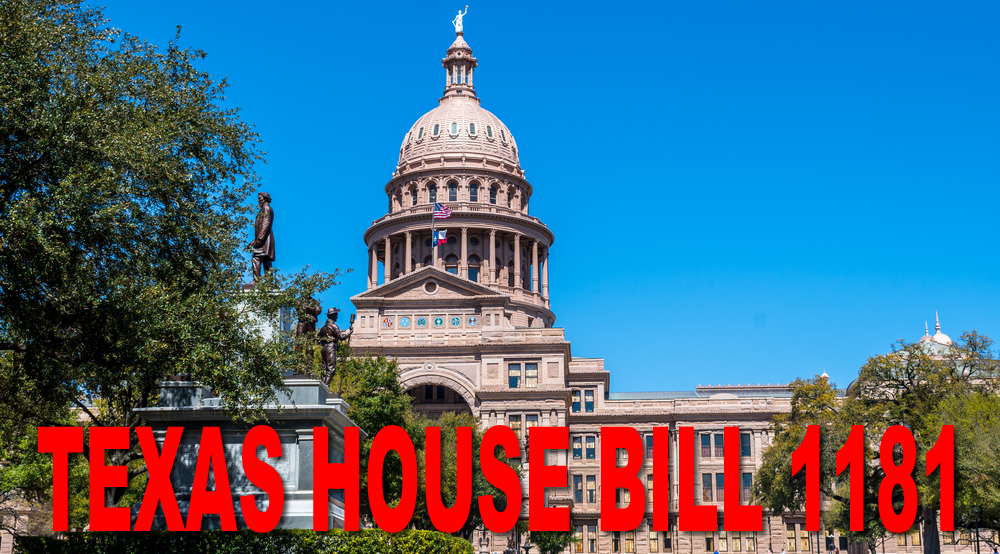Supreme Court to Review Texas Porn Law
Supreme Court to Review Texas Porn Law by Quinn Collins, BonePage.com Lead Research Journalist
This article sponsored by Texas Sexbook
 The U.S. Supreme Court has agreed to review Texas porn law that was passed under House Bill 1181 in June of 2023. The bill was originally authored by Representative Carrie S. League, and was introduced in the Texas House of Representatives in 2023. It passed the House on a largely partisan vote, with most Republicans supporting it and most Democrats opposing it. The bill then proceeded to the Texas Senate, where it underwent some revisions. You can find the specific details of the Senate committee report and any amendments on the Texas Legislature website. Texas House Bill 1181 was officially passed and became law effective September 1, 2023.
The U.S. Supreme Court has agreed to review Texas porn law that was passed under House Bill 1181 in June of 2023. The bill was originally authored by Representative Carrie S. League, and was introduced in the Texas House of Representatives in 2023. It passed the House on a largely partisan vote, with most Republicans supporting it and most Democrats opposing it. The bill then proceeded to the Texas Senate, where it underwent some revisions. You can find the specific details of the Senate committee report and any amendments on the Texas Legislature website. Texas House Bill 1181 was officially passed and became law effective September 1, 2023.
Texas Age Verification Law for Porn Sites
The Texas Age Verification law for porn sites as established under House Bill 1181 focuses on restricting access to “sexual material harmful to minors” on internet websites. The law requires websites hosting such content to verify a user’s age (at least 18 years old) before granting access and establishes a civil penalty for non-compliance. The bill originally mandated health warnings about the psychological risks of pornography, but this part was struck down by a federal appeals court.
The Texas Age Verification law is currently on hold due to legal challenges by the adult entertainment industry. The case will be heard by the U.S. Supreme Court who will decide the law’s fate in the coming months.
Arguments in Favor of the Texas Porn Law
 Supporters of Texas House Bill 1181, the age verification law for pornographic websites, present several arguments including:
Supporters of Texas House Bill 1181, the age verification law for pornographic websites, present several arguments including:
Protecting Minors
The primary argument centers on protecting children from exposure to sexually explicit content. Proponents believe minors are especially vulnerable to the potential negative effects of pornography and that age verification will create a significant barrier.
Parental Control
Supporters argue the law empowers parents by giving them more control over unsuitable content that children can access online. Age verification makes it harder for minors to bypass parental restrictions.
Reduced Societal Harms
Some proponents believe widespread access to pornography contributes to negative societal consequences. Age verification, they argue, can reduce these harms by limiting access. Examples of cited harms include unrealistic sexual expectations, potential addiction, and desensitization to sexual violence.
Arguments Against the Texas Porn Law

First Amendment Concerns
Critics argue the law restricts access to adult content protected by the First Amendment’s right to free speech. They say the bill goes beyond regulating obscene material and restricts speech that may be offensive but still protected. Opponents argue the law could discourage adults from accessing legal content altogether due to privacy concerns or the hassle of age verification. This could have a chilling effect on free speech more broadly.
Privacy Risks
Some argue the law places an unfair and unrealistic burden on websites to implement age verification systems, potentially leading to the collection and storage of sensitive user data. This data could be vulnerable to breaches or misuse.
Effectiveness
Opponents point out that age verification is easy to circumvent with fake IDs or other methods, making it an ineffective way to keep pornography away from minors. They suggest focusing on parental controls and education instead.
Legal Challenges to Texas Age Verification Law
The Texas Age Verification House Bill 1181 has been challenged in court and a federal judge issued an injunction against it, citing some of the opposition concerns listed above. The adult entertainment industry argues the law restricts free speech. A federal judge initially blocked the law, but a federal appeals court reversed that decision in March 2024, allowing the age verification requirement to go into effect. The adult entertainment industry appealed again, and in May 2024, the U.S. Supreme Court agreed to hear the case. The future of the Texas Age Verification law now hinges on the Supreme Court’s final decision.
Our Take on the Texas Porn Law
Attempts to legislate human behavior are often misguided and we certainly believe House Bill 1181 is a prime example. Some porn websites, like Pornhub, have chosen to block users in Texas altogether rather than comply with the law. Regardless, minors who are intent on finding adult content will easily do so just as they find information about illicit drugs and they find sources for cigarettes and alcohol. Legislation is not the answer. Parental oversight and education are the answer.
BonePage Commitment to Responsible Access
At BonePage.com, we firmly believe that adult content is strictly for adults and should never be accessed by minors. BonePage.com is dedicated to promoting a safe and respectful online environment for all users. We believe that with proactive parental supervision and the use of appropriate tools and guidelines, the internet can be a safe and enriching space for minors. We encourage all parents and guardians to take an active role in guiding and protecting their children’s online experiences.
Upholding Free Speech
While we strongly support the ideal of free speech and the freedom for adults to engage in lawful activities, we equally recognize the importance of safeguarding minors from exposure to adult content. We believe that the responsibility of monitoring and supervising minors’ access to electronic devices connected to the internet lies with their parents or guardians.
Parental Guidance and Supervision
To assist parents and guardians in protecting their children from accessing unsuitable content, we offer the following recommendations:
Open Communication
Engage in open and honest discussions with your children about the internet and the types of content they may encounter. Explain the importance of age-appropriate content and the potential risks of accessing adult material.
Use of Parental Control Software
Install and regularly update parental control software on all devices your children have access to. These tools can help filter and block inappropriate content, including adult material. This is one of the best ways to ensure browsing safety for children.
Regular Monitoring
Routinely monitor your children’s online activities. This includes reviewing their browsing history and knowing which websites they visit and the types of content they view. This can alert you to troubling online activity before it becomes a bigger problem.
Setting Boundaries
Establish clear rules and guidelines for internet use. This might include setting time limits, specifying approved websites, and encouraging your children to seek permission before accessing new sites.
Educating About Online Safety
Teach your children about online safety, privacy, and the importance of not sharing personal information with strangers or on unfamiliar websites. The truth is that adult websites are not the biggest threat to children. A much bigger problem are the predators who spend time grooming potential victims. This behavior usually begins innocently enough through social media or websites where children spend time interacting with online communities.
Safe Search Settings
Enable safe search settings on search engines and ensure they are activated on your children’s devices. This can help filter out explicit content from search results. You can also view search history to keep an eye on your child’s interests and online activities.
Age-Appropriate Content
Encourage your children to use age-appropriate websites and apps that are designed for their developmental level and interests. Be sure to keep communication open and monitor this content as predators often lurk in these websites and apps.
Reporting Inappropriate Content
Educate your children on how to report inappropriate content they may come across online. This empowers them to take action if they encounter something unsettling or harmful. Be sure your children trust you and can feel comfortable talking with you about anything they find suspicious or unsettling.
Quinn Collins, Lead Research Journalist
Quinn Collins is a highly-regarded research journalist who attended journalism school at Columbia University and is based in New York City. With over two decades of experience in the field, Collins has established a reputation for his insightful coverage of political, First Amendment, and equality issues in the United States. We are pleased to have Quinn as a member of the Bonepage team.
Collins brings a wealth of knowledge and expertise to the subjects he covers, and his writing style is both engaging and informative. Whether it’s breaking down the latest political developments or exploring the legal complexities of First Amendment rights, Collins is dedicated to delivering accurate and impactful journalism that informs and inspires. His commitment to social justice and equality has made him a leading voice in the ongoing conversations about these important issues, and he continues to push for progress through his reporting.
Contact Quinn Collins: QuinnCollins@teamdnp.com
Link to Quinn’s Bio: Quinn Collins
More BonePage.com Articles to Explore


